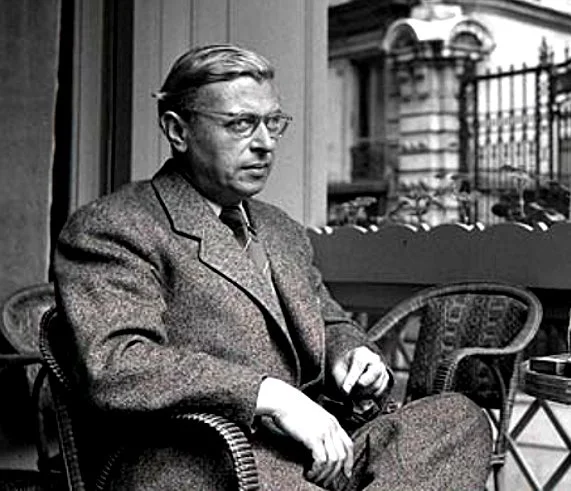8.10.25
The Event
The Players
Brandon Fricke
GARCIN
Sadie Kuwano
INEZ
Alyson Merki
ESTELLE
Marc Jordan Cohen
VALET
The Play
Jean-Paul Sartre’s No Exit is a cornerstone of existentialist drama, a gripping one-act play that distills the human condition into a single, inescapable room. Written in 1944 during the height of World War II, the play remains a searing exploration of guilt, self-deception, and the unbearable weight of being perceived.
The plot unfolds in a drawing room with no mirrors, no windows, and no sleep. Three damned souls—Garcin, Inez, and Estelle—arrive expecting fire and brimstone, only to discover that their eternal torment is far more psychological: each other. As secrets unravel and facades crack, the characters are forced to reckon with who they truly are, and more disturbingly, how others see them. The room becomes a crucible where lies blister away and self-image turns to ash. Sartre’s masterstroke is not in horror, but in implication: the mind is the prison, and our punishments are tailor-made by our own choices.
Audiences have long been captivated by No Exit for its claustrophobic intensity and its unnerving relevance. It’s been praised for its sparse elegance, theatrical potency, and the uncomfortable truths it forces us to confront. Its themes—self-delusion, moral accountability, the dread of exposure—remain shockingly resonant in an age of curated identities and constant surveillance. Whether you're new to existentialism or just intrigued by a drama that unspools like a thriller, this reading promises to be a sharp, unrelenting, and darkly compelling journey into Sartre’s timeless vision of the afterlife.
The Playwright
Jean-Paul Sartre (b. Paris, 1905) was not only one of the most influential philosophers of the 20th century, but also a bold and incisive playwright whose work helped redefine modern drama. A towering figure in existentialist thought, Sartre used the stage as a space to dramatize the ideas he explored in his philosophical writings—freedom, responsibility, bad faith, and the anguish of existence. His plays are not dry treatises but visceral, immediate, and emotionally charged, confronting audiences with the consequences of human choice and the burdens of self-awareness.
Sartre lived through both World Wars and was deeply shaped by the moral crises of his time. His refusal to accept the Nobel Prize for Literature in 1964 reflected his commitment to independence and the belief that a writer should not be institutionalized. Sartre’s dramatic works, including No Exit, Dirty Hands, and The Flies, use concise, minimalistic settings and sharp dialogue to pose philosophical dilemmas in terms audiences can feel, literally trapping his characters within their own lies, politics, and pasts. His characters often face no villains but themselves.
Sartre’s impact reaches far beyond the stage. His existentialist ideas permeated literature, film, psychology, and political discourse, influencing generations of thinkers, writers, and activists. For theater, he helped unlock a new kind of storytelling—one that didn’t rely on spectacle or sentiment but on confronting the raw, often uncomfortable realities of human existence. Watching a Sartre play isn’t just witnessing drama unfold; it’s stepping into a mirror and being asked to stay there, eyes open.
Photo from the archive of Clarín






